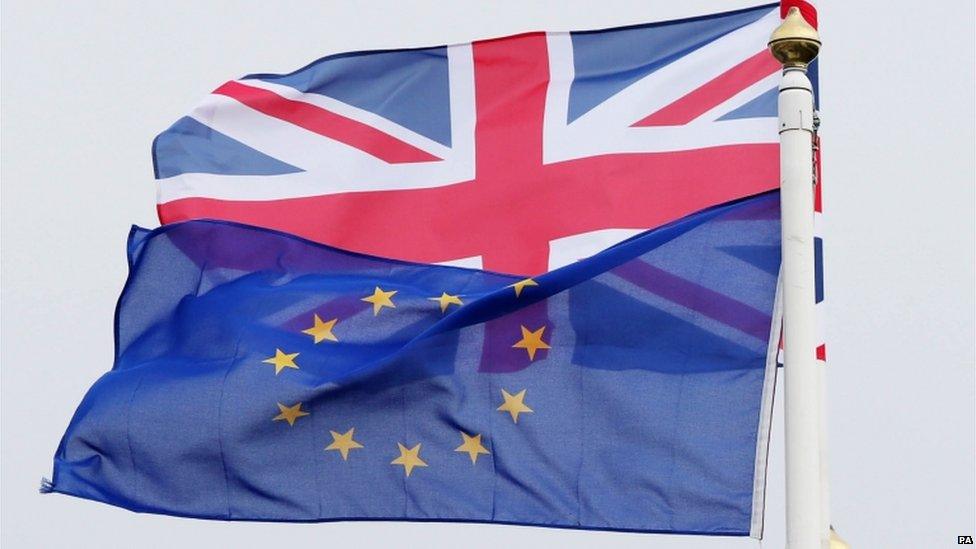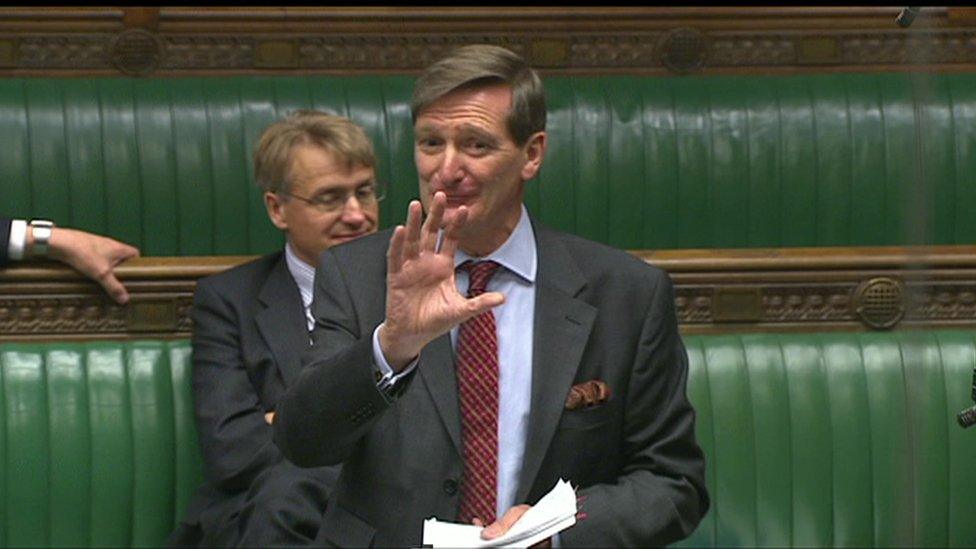Brexit: How will Parliament vote on a final deal?
- Published
- comments

Here we go down the rabbit hole…..what will be the meaning of Parliament's promised "meaningful vote" on the terms of any Brexit deal Theresa May negotiates with the EU?
This is a question which takes its asker into the heavily-mined, crater-dotted, no-man's land that lies between Parliament and government.
So how did we get here?
Just before Christmas, MPs amended the EU Withdrawal Bill, external to, in effect, make it impossible for the government to implement Brexit until they had given the thumbs up to whatever deal was struck (along with the parallel political declaration on the long-term UK-EU relationship) - and the government gave assurances that Parliament would have that "meaningful vote".
But it's not even clear to MPs, let alone the general public, how the parliamentary votes to make this fateful decision will be structured.
So this week the Commons Procedure Committee, external began an attempt to chart a course through this extremely dangerous terrain. The committee has some cred in this area, having created a system for monitoring changes in the law made under the sweeping powers conferred by Brexit legislation, and defended it when it looked like ministers were trying to water down one aspect of the new scrutiny system.
But this time their efforts triggered a blast of fury.
The immediate cause was the publication of a memo from the Brexit Secretary, Dominic Raab, setting out how the government thought the meaningful vote should work. His key point was that there should be no legal uncertainty as to whether Parliament had properly voted on the deal (MPs get to approve it, peers just have to "take note").
Yes-No question?
The big stumbling block is that Parliament cannot, by itself, amend the withdrawal agreement, because it is an international treaty negotiated with the EU.
Should it want changes, British ministers would have to go back and try to negotiate them.
Nor, Mr Raab says, could Parliament delay or prevent the UK's departure because these are already set by UK law and by the Article 50 process laid down in EU law - although this point will soon be tested in court. Mr Raab's memo argues that any amendment would undermine the government's ability to ratify the withdrawal deal.
On that logic, he argues that the real question that MPs will face is a simple "Yes-No" - whether or not to accept whatever deal Theresa May brings back from Brussels.
In that case, he adds, the normal shape of Commons voting, where amendments are put down, some are selected by the Speaker, and they are voted on, before the main approval motion (perhaps, by then, amended in some way) is put to the House, is the wrong way round.

What move will former Attorney General Dominic Grieve consider? (Behind him on the benches, is Charles Walker, chair of the Procedure Committee).
So his memo rejects the normal method and comes down in favour of a procedure based on the way Opposition Day motions are considered - the main motion is voted on first, and only if it is lost, do MPs then go on to consider alternatives.
The point is that the Raab approach puts a much harder choice in front of potential Conservative dissidents, in particular. It's one thing to support an amendment softening (or, indeed hardening) whatever the government proposes, passing that, and then supporting the resulting proposition; it is quite another to vote down the government deal and then see what might happen afterwards.
Is this fixing the decision? The author of last December's "meaningful vote" amendment, the former Attorney General, Dominic Grieve, dismisses Mr Raab's concerns with a dismissive Anglo-Saxon monosyllable - and Labour have denounced his proposal as a blatant fix.
So MPs are now in a situation where it will be even harder to find an agreed method to make this critical decision, and the Procedure Committee is now in the spotlight. And next week could see some serious pushback against Mr Raab; in particular, watch the other Dominic, Mr Grieve.
What if MPs rejected the Brexit deal?
But suppose - under the Raab procedure or some other method - MPs did vote to reject the Brexit deal?
It's not clear what impact any subsequent votes would have. They could pass an amendment calling for the government to renegotiate some aspect of withdrawal, but they could not guarantee that ministers could get the desired result, or even make them try very hard. They could demand a second referendum - but to make that stick they would have to pass a full-dress Act of Parliament; a mere resolution, claiming to direct the government, would not cut the mustard.
Parliament and its existing procedures for debate and decision are not really configured to make policy - they scrutinise policy and make laws, but it is much more difficult for MPs to instruct ministers, and harder still for them to make their instructions stick, unless they are passed as legislation.
The former Lib Dem MP and constitutional law professor, David Howarth, has argued that the ultimate weapon available to MPs is to insist on the ancient parliamentary principle of "grievance before supply" and refuse to pass the next finance bill until the government concedes a further Brexit referendum.
Others think that is a bit fanciful, but the forthcoming Budget and the ensuing Finance Bill will provide serious leverage for those unhappy with the government's position.
This might be exerted through something quite procedural like messing with the programme motion which would timetable consideration of the Chancellor's tax changes - but, faced by rising factional discontent from its in-house Leavers and Remainers, and from its DUP allies, the government is now dangerously vulnerable.
